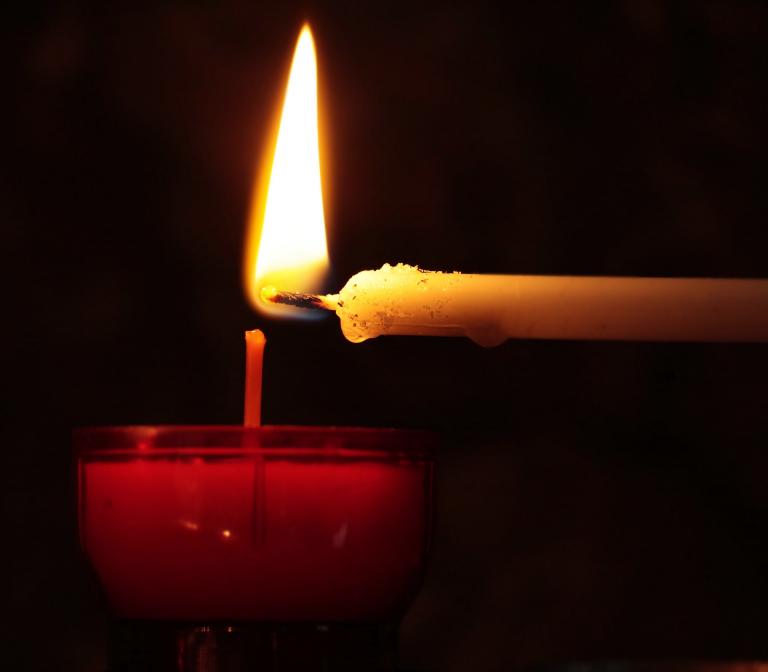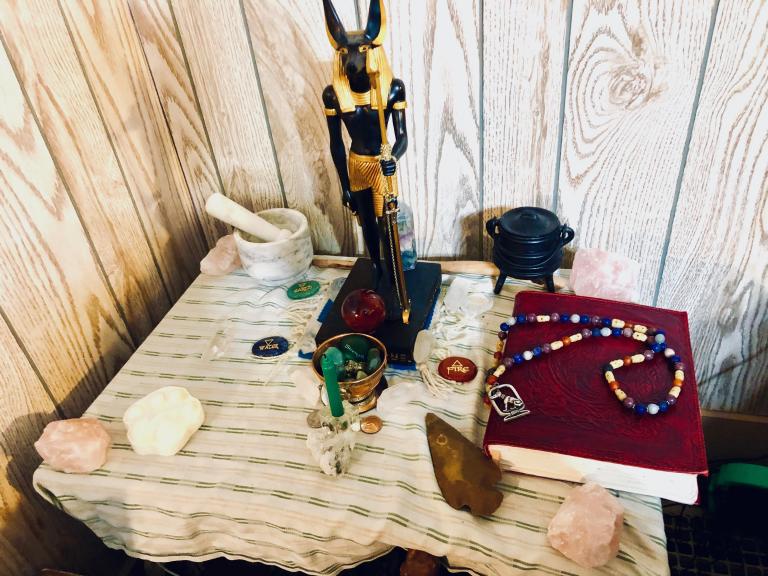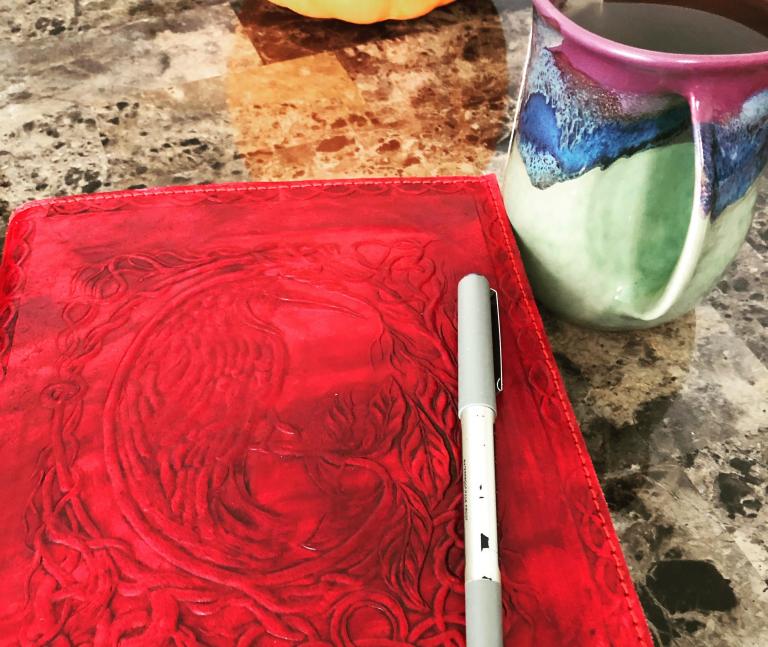I get a lot of questions from people who want to know what to do once they’ve received some kind of message or communication from a deity; in this case, it’s Anubis. Where do you take that initial connection further? How do you begin to deepen a relationship? What does it even mean to embark on a relationship with a deity? I’ve talked previously on various ways to connect with Anubis. My suggestion, as I hinted in my previous article, is to establish a daily practice.

A daily practice doesn’t necessarily have to be in devotion to the gods. It can be a devotion to healing, to working on a specific practice, to connecting with the elements, or anything that is meaningful to you and something you wish to devote to deepening. Some people go so far as to make an unwritten (or sometimes written, even) contract to hold themselves accountable and commit to it. Finding a way to hold yourself accountable is important, and there have been plenty of articles, and even books, written on this topic, so what I’m going to say is neither new, nor is it an all-inclusive list of the possibilities. The possibilities are, as the saying goes, endless!
Why?
Establishing a daily practice is a way to honor the gods and goddesses to which you feel closest. In essence, you are devoting yourself to deepening your connection with the gods, to building a relationship. Not only this, but for me personally, it gives me something to look forward to each day. I look forward to those morning hours when I am communing with the deities and spirits with whom I’ve built a relationship.
Why would you do this? It honors and gives thanks for their presence in your life, whatever that might look like. It gives you a sense of purpose and direction in your practice. It also strengthens your relationship with them. Building a relationship with a deity isn’t a one-way street. They aren’t pawns to come when beckoned. The gods are independent, sovereign beings with their own ideas, desires, and goals. Asking something of them requires something in return. You can’t expect them to always come when called and do what you ask (or demand) of them. It doesn’t work that way.

Altar
Having an altar is a great way to establish a place within your home where you can commune with your chosen deity. I talked more extensively on this in my last article, Creating a Sacred Space for Anubis. Common altar items include statues, candles, symbols, stones, plants, etc., but these aren’t the only things you can add to your altar. Make it purposeful and meaningful to you and your deity.
Not everyone is open with their path, especially when surrounded by family members who may not understand. There’s nothing wrong with that. That’s a personal choice. There are alternative ways to establish some kind of personal, sacred space where you can honor the gods in a less conspicuous way. Find a table, shelf, or small space to set up a candle and a statue of a related animal (for Anubis, perhaps a wolf or coyote), for example. Or maybe a simple photo or piece of artwork (make it extra meaningful by drawing or painting it yourself!). Having something meaningful is the key. So long as it’s meaningful to you and dedicated to your deity or spirit, that’s the important thing.
On my altar dedicated to Anubis, I’ve included a statue of him along with a couple candles, a few stones (labradorite, black onyx, and smoky quartz), and an incense burner.
Words
I personally love words – spoken and written, but especially written. I always have. I have always been a writer since I was old enough to hold a pen. I loved words so much I got both my Bachelor’s and Master’s degrees in Linguistics.
Writing is my preferred method of communication. I write as a devotional act. It could be a prayer, a poem, or perhaps just freewriting my thoughts on a particular subject. I have lots of notebooks, and even digital platforms, where I can write wherever I happen to be whenever the desire strikes to write.
Spoken word is another form of communication that can be a devotional act. You could call it prayer, but not all pagans like that word, perhaps because they feel it has too many associations with mainstream religions that they don’t wish to be associated with. I’m not too keen on the particulars of what you choose to call it. I don’t necessarily always call it ‘prayer’, but I do have conversations with my deities. I talk to them openly and honestly. For me, it’s not formal. I don’t sit down and write out word-for-word what I want to say to them, though sometimes I do if I am looking to present it in a formal ritual, but I feel that is a separate topic in itself.

Music
Not everyone is big on music, but for me, music is a core part of my life. I have music playing throughout my day, practically every single day. Personally, I have a wide-reaching taste in music that really depends on what mood I am in. I have music for various moods.
I feel that music can really set the mood. Listening to a sad song can really connect you to those emotions presented in those songs. Listening to an upbeat, happy song can bring those emotions out of you, too. A dear friend of mine once said “listen to music for the mood you want, not the mood you are in”. I feel this also applies to your devotion to the gods. Find something that really gets you in that feeling – perhaps with a good drum beat that you can focus on. I’ve found particular songs on Spotify that really make me feel connected to Anubis and Hekate.
I am all for making things personal to you and taking off with your creative side. Make your own music! Drum, sing, play an instrument. You don’t have to be an excellent musician to do something in devotion to your gods and goddesses. You don’t even have to go out and buy something. Find a makeshift drum from items around your house. What matters more is that you are doing it as a devotional act and that it comes from a place of meaning and purpose.
Learning
I feel that there is a bit of devotion in taking the time to learn something. I have always been a firm believer that you never really stop learning. No matter how much you may think yourself knowledgeable in an area, there is always room to learn more and/or to deepen that knowledge.
Take the time to find a book or article and read. Watch videos. Whatever you feel is your preferred method of absorbing information. In this case, perhaps you can read some of the myths and stories centered around your deity. I am currently working my way through the Book of the Dead, which is rather dense, but I personally enjoy reading it as a learning tool to learn more about how ancient Egyptians may have lived their lives in preparation for the afterlife.

Witchcraft
Not every pagan is a witch, and not every witch is a pagan, but for me personally, I am both, and I incorporate both into my daily practice. If you choose to incorporate witchcraft into your life, either inclusively or exclusively, the idea of the Witches’ Hour of Power, as described by Cyndi Brannen, is a great way to devote your time to yourself and to your witchcraft.
In short, it’s basically the idea of dedicating an hour of your time every day towards your own personal development and possibly spiritual development, if witchcraft is a part of that for you. It isn’t necessarily in devotion to a particular god or goddess. Anubis is a part of my daily practice, and I often incorporate witchcraft there as well. For me, my daily practice is blended into my witches’ hour of power.
Putting It All Together
Now, how does this all fit together? I can hear people saying, ‘ok – this sounds great, but I am so busy, I don’t know that I have time to commit to all of this’. That’s certainly understandable, so if all you can devote time to is 15 minutes a day, then go with that. But I feel that there is value in devoting a time in your day to your growth. I should preface by saying that my daily practice shifts and changes over time, depending on my life circumstances and my own personal needs.
The first suggestion I have is stick to it! Neglecting to maintain a daily practice that you have promised to upkeep can have consequences. For me, I end up with broken statues of Anubis. I know that sounds odd, and perhaps a little woowoo-y, but each time in my life where I’ve neglected to keep my promises to Anubis, I end up with one of my statues of him broken, either partially or completely shattered. I’ve had them mysteriously fall off of the shelf or table where they were sitting while no one was around. Also, one time during a move across the country (2,500 miles, to be exact), the one and only thing that broke out of my truck full of stuff was a small statue of Anubis, and I realized that there was a reason behind that. It’s happened enough times (at least 5) that I find it to be more than sheer coincidence. Maybe I’m wrong. Maybe it was just a coincidence, but I can look at it now with a bit of humor, and in all seriousness, it has been a great reminder to maintain my commitment to a daily practice.

Pick something that you know you will do. Meditations, prayers, writing, drumming, dancing…whatever it might be. Start with something you know that you’ll stick to and do continuously. It’s better to do something that you know for sure you’ll do daily than to try to do whatever you feel like each day and always change it up. You can add things, remove things, change things, sure, but just be sure that whatever it is that you choose to do, that you make the commitment to continuing it for as long as you and your deity have agreed to doing.
You’re going to find that there is no right or wrong way to honor your gods and goddesses. I can’t sit here and tell you what to do or how to do it. Like I’ve said again and again, a daily practice is, and should be, highly personal. I can, however, give you at least a small portion of ideas that can be utilized in your own daily practice. From there, it’s up to you. Find something that you can do and that you can stick to.


















